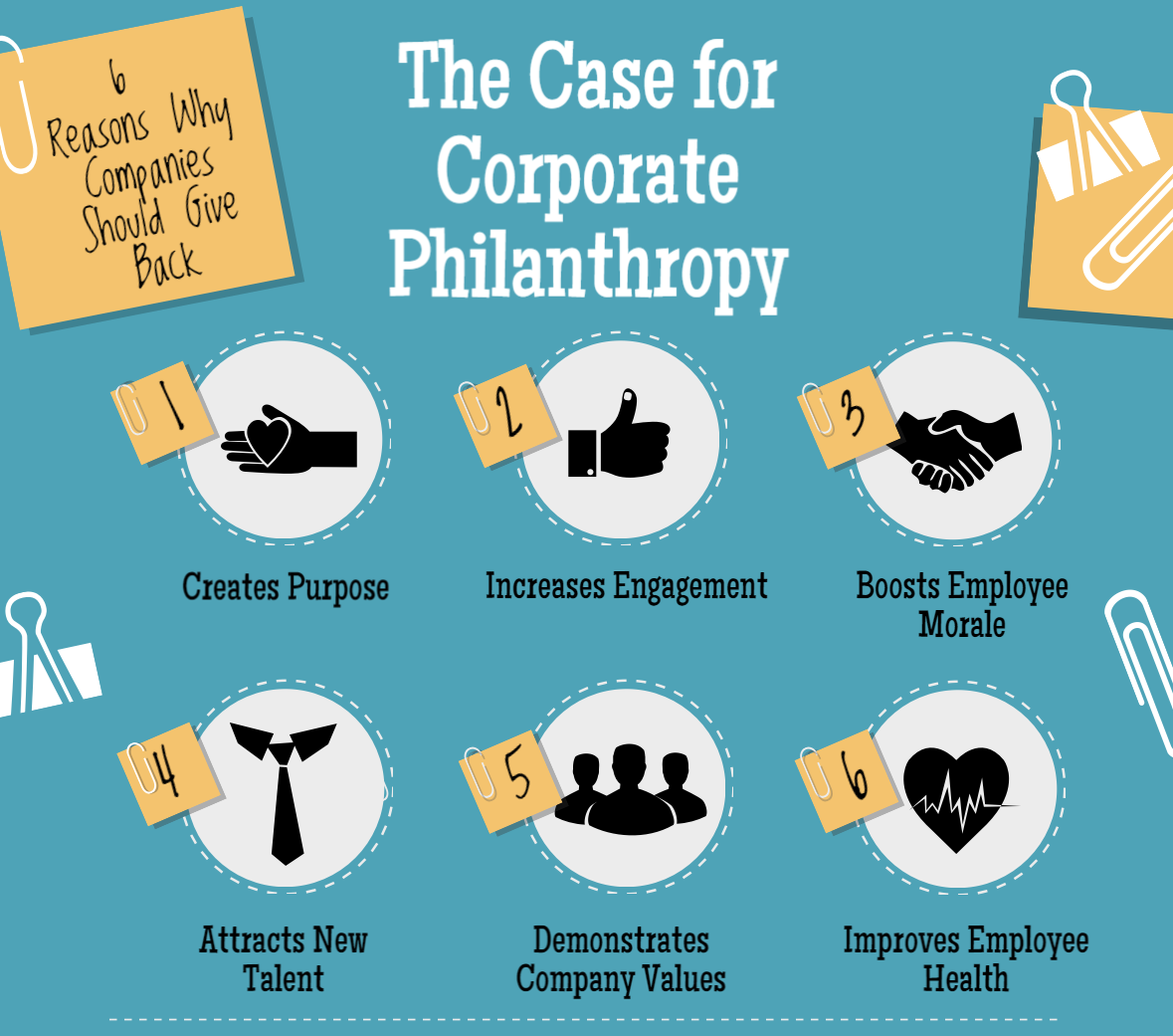Quick-start checklist to launching a corporate philanthropy program that works
The Role of Corporate Philanthropy in Fostering Sustainable Company Practices
Business philanthropy has arised as a critical strategy for services aiming to integrate sustainability right into their procedures. By aligning corporate goals with environmental and social campaigns, companies can promote much healthier communities. This approach not only enhances business credibility but additionally strengthens stakeholder connections. Nonetheless, truth extent of its effect on lasting business success continues to be to be checked out. What cutting-edge techniques are being embraced as an outcome?
Understanding Company Philanthropy and Its Importance
Business philanthropy serves as a crucial device where companies can add to societal health while enhancing their own track records. This method entails companies designating sources, such as funds, time, or expertise, to sustain area initiatives, charitable causes, or social programs. By participating in humanitarian initiatives, business can attend to pressing social problems, such as education and learning, healthcare, and environmental worries, therefore playing an essential duty in promoting positive adjustment.
Business philanthropy can enhance worker morale and draw in ability, as individuals progressively seek to work for socially accountable companies. It can additionally enhance client loyalty, as consumers like brands that demonstrate a dedication to making a difference. Eventually, recognizing the significance of business philanthropy hinges on identifying its twin benefits: enriching neighborhood welfare while simultaneously boosting service reliability and credibility in the eyes of stakeholders. This alignment of social responsibility with commercial passions highlights its relevance in today's business landscape.
The Connection In Between Company Philanthropy and Sustainability
While many firms take part in philanthropy to enhance their public image, a deeper link exists in between company philanthropy and sustainability. Corporate philanthropy commonly straightens with sustainable methods by sustaining initiatives that attend to ecological and social obstacles. When businesses buy area jobs, renewable power, or academic programs, they add to a healthier environment and culture. This commitment not only cultivates a good reputation but likewise enhances stakeholder partnerships, boosting brand loyalty.

Situation Studies: Successful Corporate Philanthropy Initiatives
Numerous business have effectively incorporated humanitarian campaigns right into their business methods, demonstrating the tangible advantages of such dedications. For example, Microsoft has launched numerous programs, such as its AI for Earth effort, which supports ecological sustainability via modern technology. This approach not only help conservation initiatives yet likewise boosts Microsoft's reputation as a leader in corporate duty.
Unilever's Lasting Living Plan highlights ecological and social impact, straightening its philanthropy with company objectives. By funding projects that enhance hygiene and cleanliness, Unilever enhances its brand name while contributing to global health and wellness.
An additional notable example is Patagonia, which vows 1% of sales to environmental reasons. This dedication reverberates with customers, fostering loyalty and driving sales.
These study highlight that efficient corporate philanthropy can produce monetary returns while advertising sustainable methods, reinforcing the idea that moral company methods are valuable for both society and profits.
Structure Stronger Stakeholder Relationships Through Philanthropy
Philanthropy acts as a necessary device for firms looking for to enhance their connections with stakeholders, as it fosters depend on and demonstrates a commitment to social obligation. By taking part in charitable campaigns, businesses can get in touch with local communities, boosting their credibility and encouraging stakeholder loyalty. This engagement typically brings about purposeful communications, producing a sense of common values between the business and its stakeholders.
Humanitarian efforts can address specific community requirements, enabling companies to add positively to social obstacles. This involvement not just showcases a company's ethical position yet likewise assists in attracting and preserving clients that prioritize social responsibility.
Additionally, workers commonly really feel much more motivated and involved when they see their company actively joining humanitarian tasks, bring about an extra productive work environment culture. As a result, company philanthropy comes to be a calculated avenue for building stronger, much more resistant relationships with diverse stakeholder groups.
Gauging the Impact of Business Philanthropy on Organization Success
The connection in between corporate philanthropy and stakeholder interaction establishes the stage for reviewing its impact on overall organization success. Organizations commonly measure this influence through different metrics, consisting of brand name reputation, worker satisfaction, and consumer commitment. Philanthropic initiatives can enhance a company's photo, promoting depend on amongst customers and investors alike. Additionally, involved workers tend to display higher morale and productivity, directly associating to boosted business performance.
Quantitative analysis can likewise be used, with companies evaluating financial returns against humanitarian expenditures. Study suggests that companies with solid humanitarian commitments usually experience greater stock efficiency and reduced volatility. In addition, qualitative evaluations, such as stakeholder feedback, can give insights right into community perceptions and lasting relational advantages.
Ultimately, determining the effect of corporate philanthropy requires a diverse approach, incorporating both qualitative and measurable information to assure a detailed understanding of its influence on service success. corporate philanthropy.
Frequently Asked Concerns
Exactly How Can Small Companies Take Part In Company Philanthropy Effectively?

What Prevail Misconceptions About Corporate Philanthropy?

Just How Does Business Philanthropy Impact Staff Member Morale?
Business philanthropy positively influences staff member morale by fostering a sense of purpose, enhancing job fulfillment, and promoting commitment. Staff members often really feel more involved and inspired when their company adds to social causes, producing a helpful workplace.
What Are the Tax Advantages of Corporate Philanthropy for Services?
Business philanthropy provides considerable tax obligation benefits for companies, including reductions on charitable payments and prospective decreases in taxable income. These motivations urge business to engage in social campaigns while all at once enhancing their monetary standing.
Just How Can Firms Select Efficient Philanthropic Partners?
Firms can pick effective humanitarian companions by examining alignment with their worths, gauging impact capacity, examining financial transparency, and promoting strong communication. This critical technique boosts collaboration and guarantees shared advantages for both parties entailed.
Business philanthropy offers as a necessary mechanism with which companies can add to social wellness while enhancing their very own credibilities - corporate philanthropy. Ultimately, understanding the significance of company philanthropy lies in recognizing its dual benefits: enriching community well-being while simultaneously enhancing service trustworthiness and reliability in the eyes of stakeholders. While many companies involve in philanthropy to improve their public picture, a much deeper link exists between business philanthropy and sustainability. The connection in between business philanthropy and stakeholder engagement establishes the stage for reviewing its influence on total business success. Corporate philanthropy supplies significant tax benefits for businesses, including deductions on read what he said charitable payments and possible reductions in taxable earnings